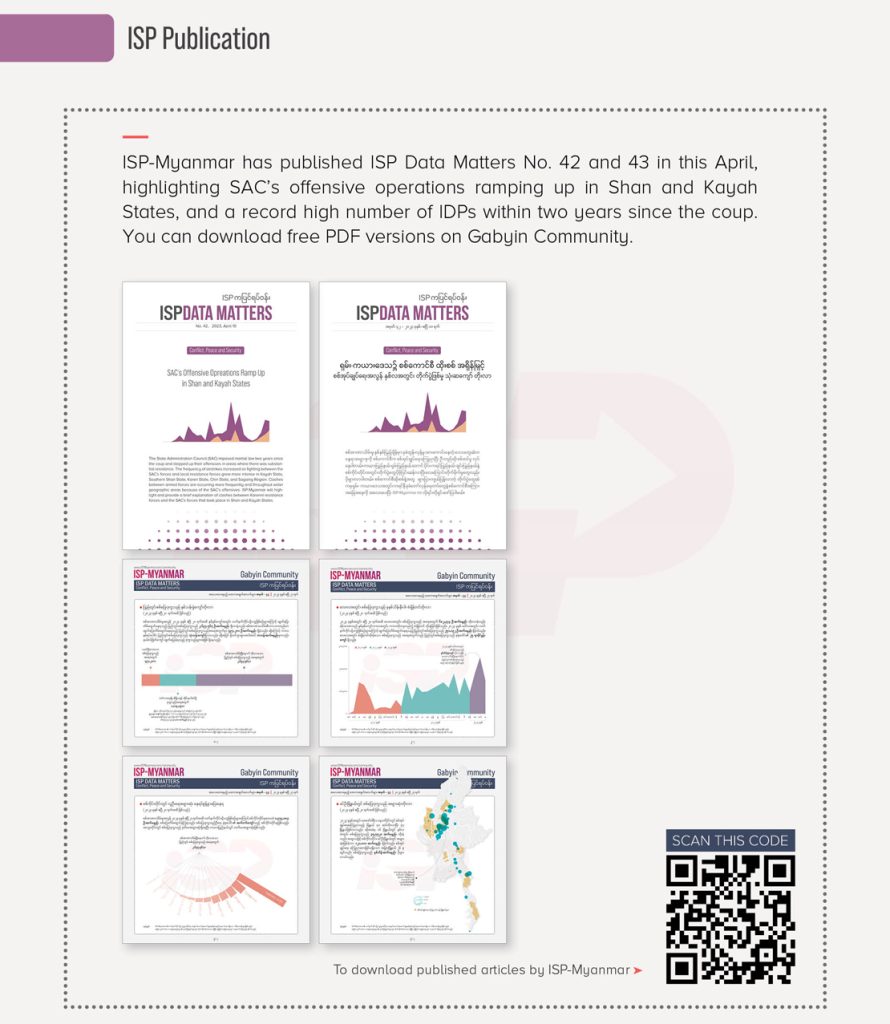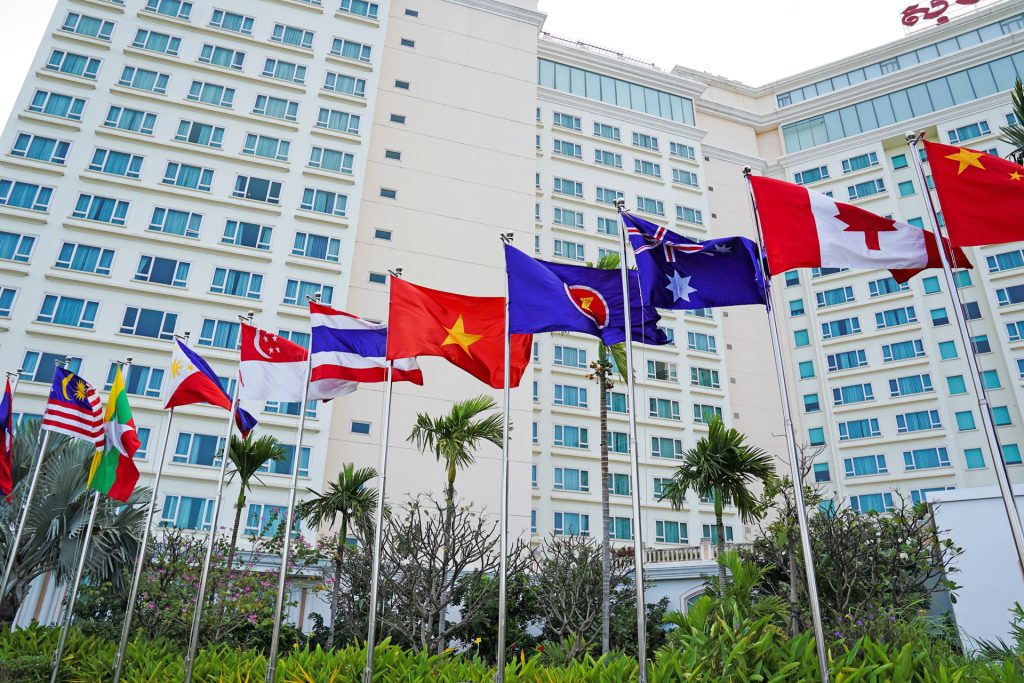Insight Email No. 13
Myanmar is currently experiencing extremely high temperatures, with many cities recording temperatures of 40 to 45 degrees Celsius. Given the frequent and prolonged power outages in many areas, it’s important to take care of yourself. The average normal body temperature is generally accepted as 37°C (98.6°F) and exposure to higher temperatures can cause the body to lose control of temperature regulation, leading to serious heat-related illnesses such as tiredness, exhaustion, cramps, loss of consciousness, and even death. It is crucial that you and your family take precautions to avoid the effects of the intense heat.
This week, ISP-Myanmar would like to highlight the increasing number of diplomatic trips to Naypyitaw which seems to project ‘the neighborhood diplomacy’ coming to the forefront and the International Court of Justice (ICJ)’s final decision against Myanmar rejecting the SAC’s request for an extension for ‘Counter-Memorial’, the ongoing plight of the Rohingya and that Myanmar’s military budget is set to swell in the 2023-24 fiscal year. Additionally, ISP-Myanmar discusses civilian protection and what the Geneva Call agreements with Myanmar’s EAOs mean in this context.
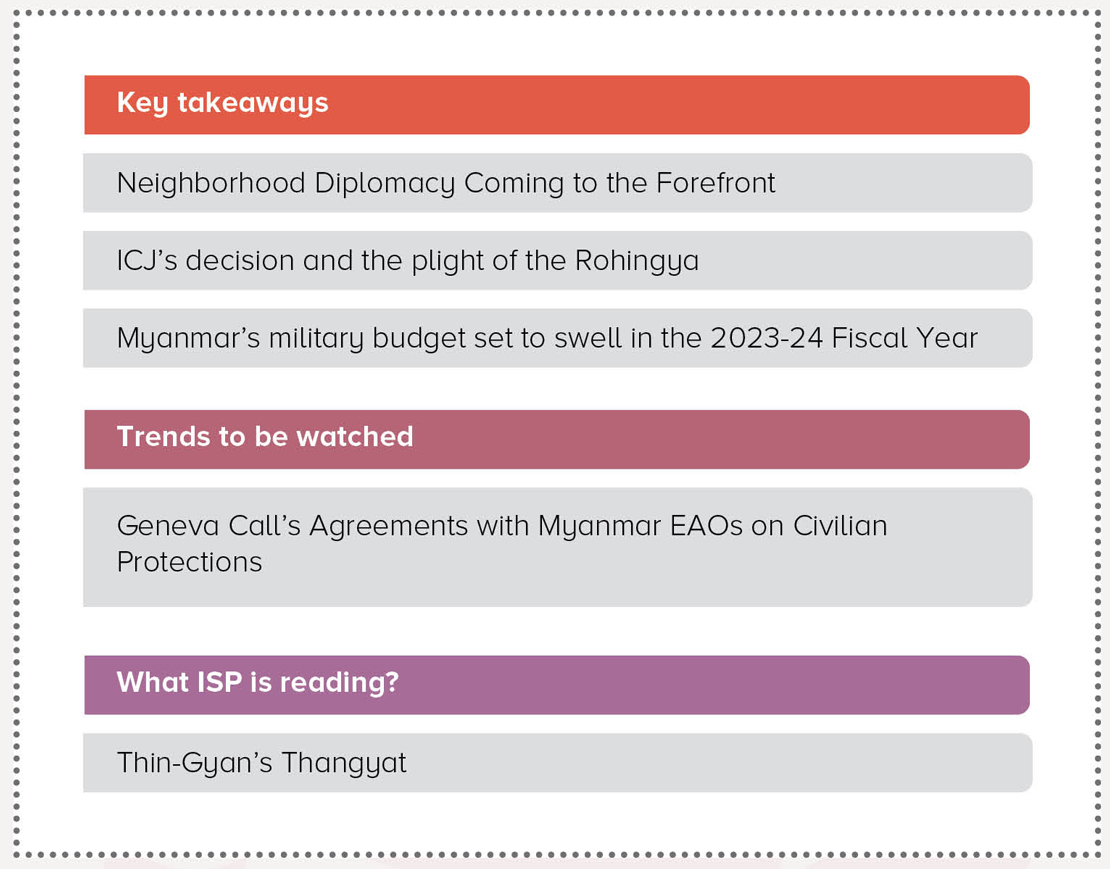
∎ Key takeaways
1. Neighborhood Diplomacy Coming to the Forefront
After China’s Special Envoy to ASEAN, Mr. Deng Xijun’s visit to Naypyitaw, ISP-Myanmar has observed more frequent international diplomatic visits and discussions in the capital. In March, Chinese Communist Party’s Secretary of Yunnan Province, Mr. Wang Ning visited Naypyitaw with a delegation and signed some trade and investment MoUs. On April 16, Director-general of the International Department of the Central Committee of the Chinese Communist Party, Mr. Peng Xiubin arrived in Naypyitaw for a four-day visit and reportedly met with former junta chief U Than Shwe and U Thein Sein.
On April 21, Thailand Deputy Prime Minister and Foreign Minister, Mr. Don Pramudwinai visited Naypyitaw and met with SAC chairman Senior General Min Aung Hlaing. Accompanying the FM on the trip was Thailand’s special envoy to Myanmar, Mrs. Pornpimol ‘Pauline’ Kanchanalak. According to the official report, the parties discussed issues such as transborder smog pollution, peace and stability in the border regions of both countries, and plans to cooperate in the eradication of human trafficking, drug trafficking, and arms smuggling. However, there is speculation that the agenda of the meeting may have been broader than what was officially reported.
On April 23, Former UN Secretary-General and Deputy Chairperson of the Elders Mr. Ban Ki-moon paid a surprise visit to Naypyitaw where he met with SAC chairman Min Aung Hlaing. Ban Ki-moon urged “the military to adopt an immediate cessation of violence, and start constructive dialogue among all parties concerned.” He was reportedly unable to meet with imprisoned leader Daw Aung San Suu Kyi during his visit.
Meanwhile, India reportedly hosted a ‘Track 1.5 meeting’ on Myanmar on April 25 in New Delhi. ‘Track 1.5’ is a diplomatic term referring to a dialogue that includes a mix of government officials, who participate in an unofficial capacity, and non-governmental experts, all of whom explore solutions for issues raised. The New Delhi meeting involved the participation of Thailand, Laos, Cambodia, Bangladesh, India, China, and Indonesia (the current ASEAN chair) in talks. Japan, a major regional donor,was unable to participate in this meeting due to the short notice provided. This would be the second Track 1.5 meeting following the Thailand-sponsored non-ASEAN open consultative meeting that took place on December 22, 2022. The third meeting is scheduled to take place in Laos.
In observing these developments, diplomacy plays with the shifting weight of the balance. The pressure from the West and ASEAN’s approach seems barely work, as ASEAN’s Five-Point Consensus has consistently taken a central role in discussions regarding the resolution of Myanmar’s crisis; however, the new initiative of diplomacy seems to shift towards “Neighborhood Diplomacy”, mainly driven by countries including China, India, and Thailand.
However, as previously discussed in ISP On-Point No. 8 and 10, ISP-Myanmar believes that the international community should acknowledge the important roles of emerging new actors, National Unity Government (NUG) and its People’s Defense Forces (PDF) and Local Defense Forces (LDFs), in addition to Ethnic Armed Organizations (EAOs) in resolving Myanmar’s conflict. More importantly, on the international stage, all special envoys to Myanmar from the UN, ASEAN, China, Japan, and other countries should collaborate towards a concerted effort that takes into account the aspirations of the people of Myanmar in any resolution of Myanmar’s conflict. ISP-Myanmar believes that the concerted effort of international actors, such as the UN, ASEAN, and world and regional powers, such as China, India, Japan, and the US is particularly key to ending the crisis.
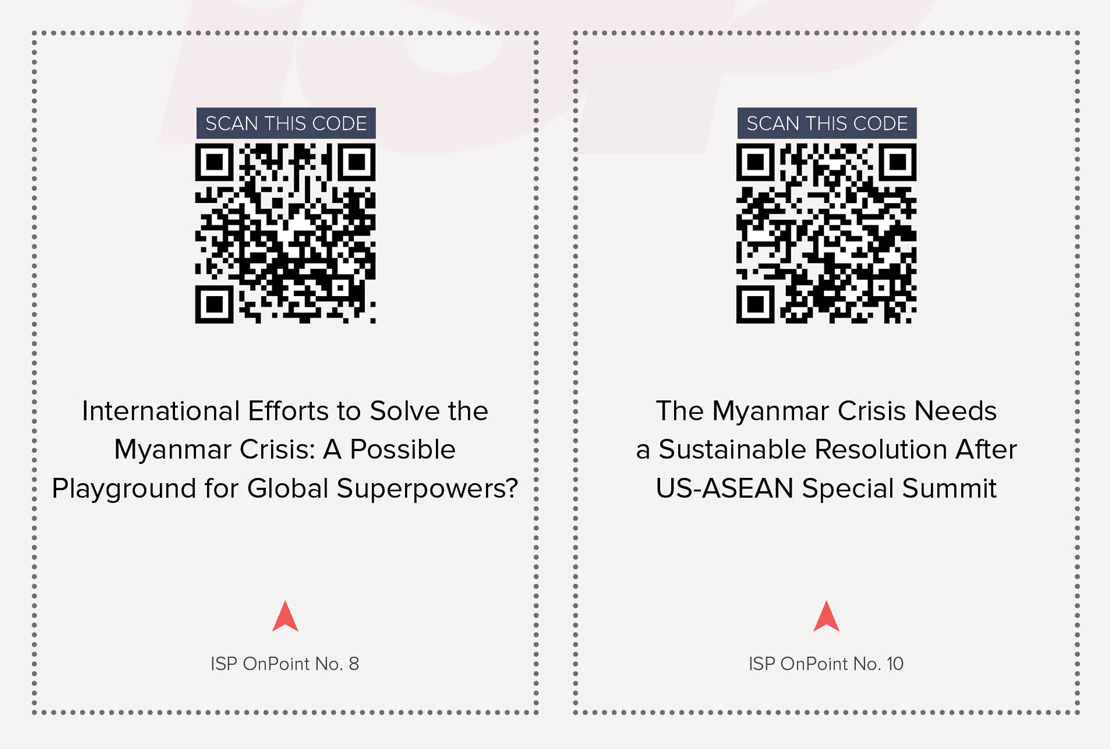
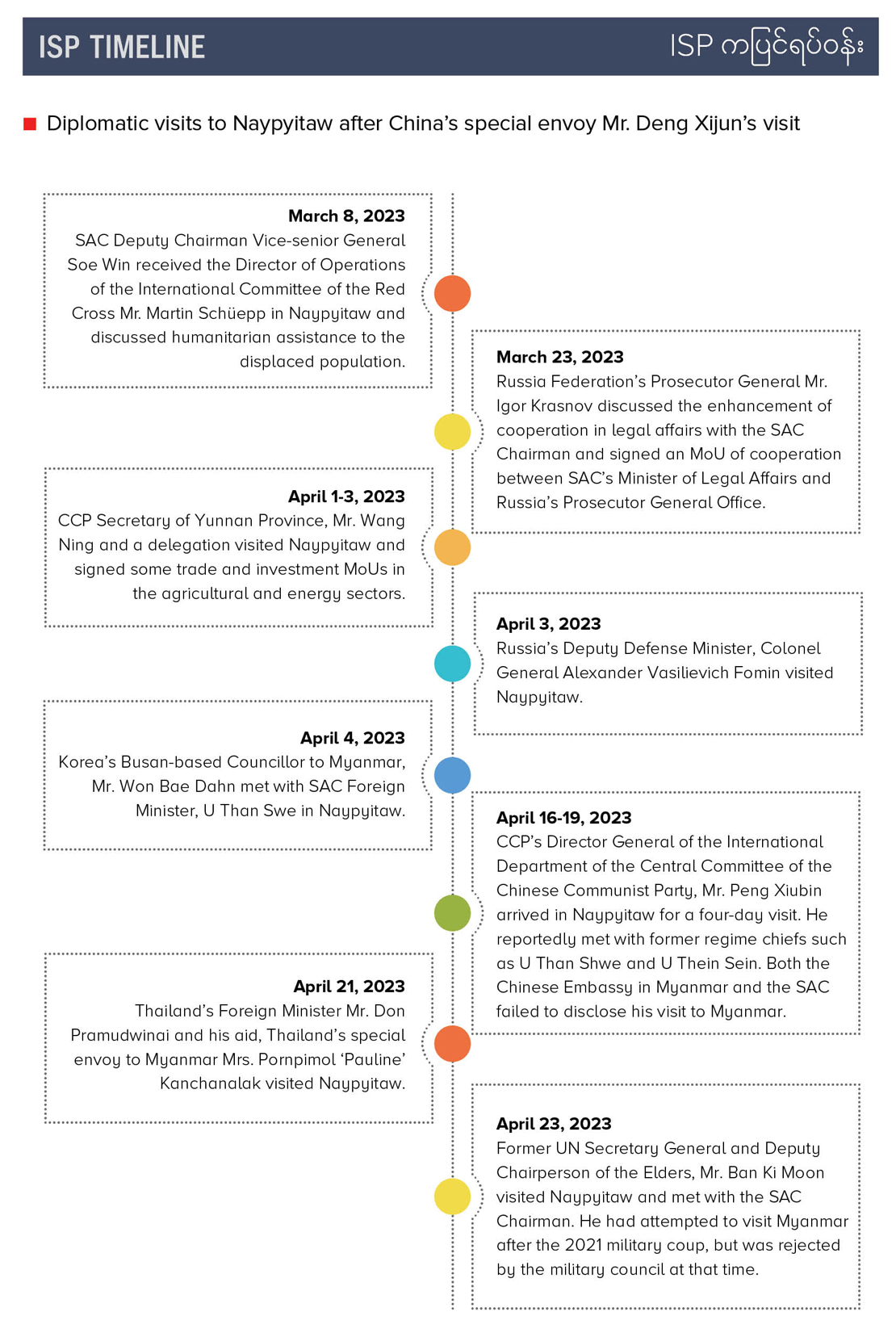
2. ICJ’s decision and the plight of the Rohingya
On April 6, 2023, the International Court of Justice (ICJ) rejected the request made by Myanmar’s State Administration Council (SAC) for a ten-month extension for the submission of a “Counter-Memorial” in response to accusations of genocide against Rohingya made by Gambia in October 2020. The Gambia had initiated ICJ proceedings against Myanmar and later submitted an over 500 page memorial supporting its position. The court had set April 24, 2023, as the deadline for Myanmar to file the Counter-Memorial. The SAC had cited reasons such as the military coup in 2021 and Covid-19 restrictions for the extension request. However, the court found the reasons to be unnecessary and rejected the request. Gambia argued that it submitted its Memorial within nine months, and Myanmar had a total of 29 months to produce its Counter-Memorial. The ruling was made by ICJ in response to Gambia’s proceedings against Myanmar at ICJ, accusing it of genocide against the Rohingya.
In recent weeks, there have been developments related to the plight of Rohingya refugees, with SAC officials and ASEAN delegates visiting refugee camps in Bangladesh and proposing a “pilot repatriation” for refugees to return to Myanmar. However the situation for the Rohingya remains appalling. According to a report from a Thai newspaper, 96 Rohingya (76 males and 20 females) were arrested in Kanchanaburi, Thailand, in the first week of April while attempting to illegally travel to Malaysia aboard five trucks. The alleged trafficking victims claimed they had paid 120,000 Thai Baht per person for the crossing. This case highlights the intolerable conditions the Rohingya face in refugee camps and the thriving cross-border trafficking business.
3. Myanmar’s military budget set to swell in the 2023-24 fiscal year
The SAC has recently enacted the “2023-2024 FY Union Budget Law” which increases military spending. This is the second time the SAC has drafted a budget for the whole fiscal year since changing the fiscal year to run from April to March after coming to power in the coup. The latest full fiscal year budget followed the drafting of the National Planning Law, with both meetings chaired by SAC Deputy Chairman General Soe Win. Previously, during the National League for Democracy (NLD) government, the Fiscal Year had been set from October to September. To cover the transition period, the SAC initiatally delivered a six-month ‘Mini-budget.’
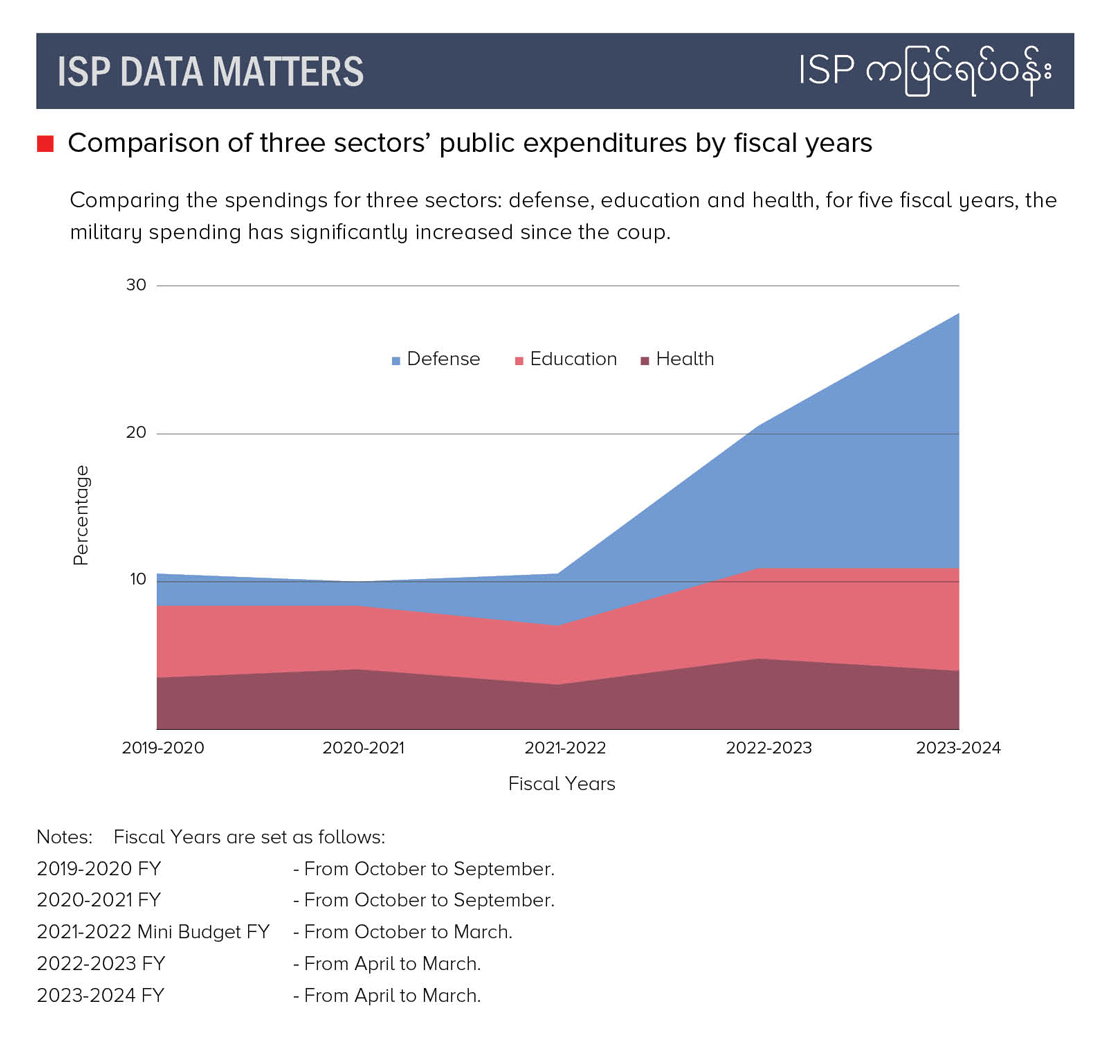
SAC Deputy Chairman General Soe Win also set a new budget policy in his speech aimed at tightening spending in order to save on fuel costs. In his speech, Gen. Soe Win stated that the SAC will carefully scrutinize fuel expenses and only allow limited fuel for administrative purposes and functions. Additionally, the SAC will not permit the construction of new offices and housing for government staff, and will also cut spending on office equipment, machinery, furniture, and luxury items. These measures are intended to bring the budget in line with policy requirements.
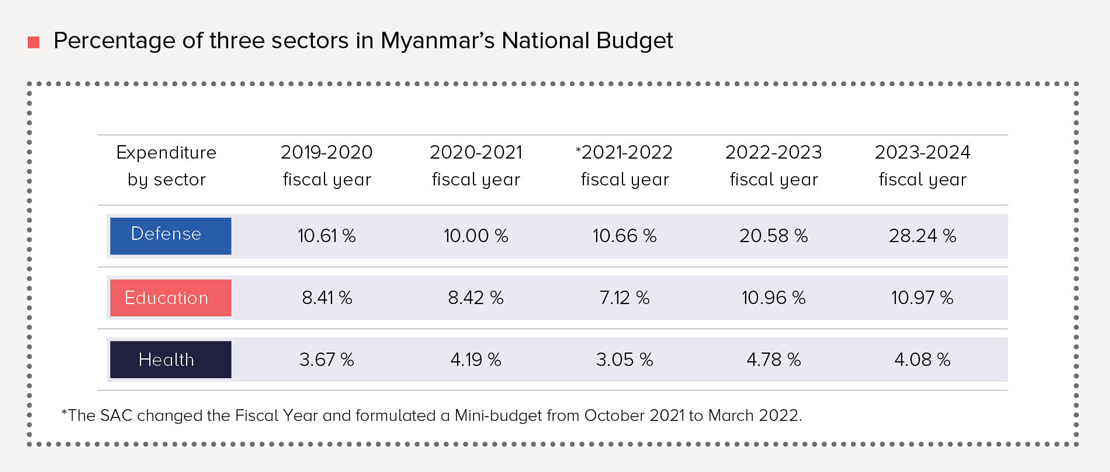
Compared to the previous year’s budget, military spending in Myanmar has significantly increased, despite the SAC’s recent speech on tightening budget policy. In previous years, the military budget comprised approximately 13 percent of the total budget. However, in the 2021 Mini-budget, military spending accounted for 10.66 percent of the budget, increasing to 20.58 percent in the fiscal year 2022-23 and further expanding to 28.23 percent in this latest fiscal year 2023-24 budget. The military junta has proposed spending of 5,600 billion Kyat (approximately USD 2.7 billion) for the upcoming year, which is 2,000 billion Kyat more than the previous year’s spending. This increase in military spending could be attributed to the ongoing conflicts across the country.
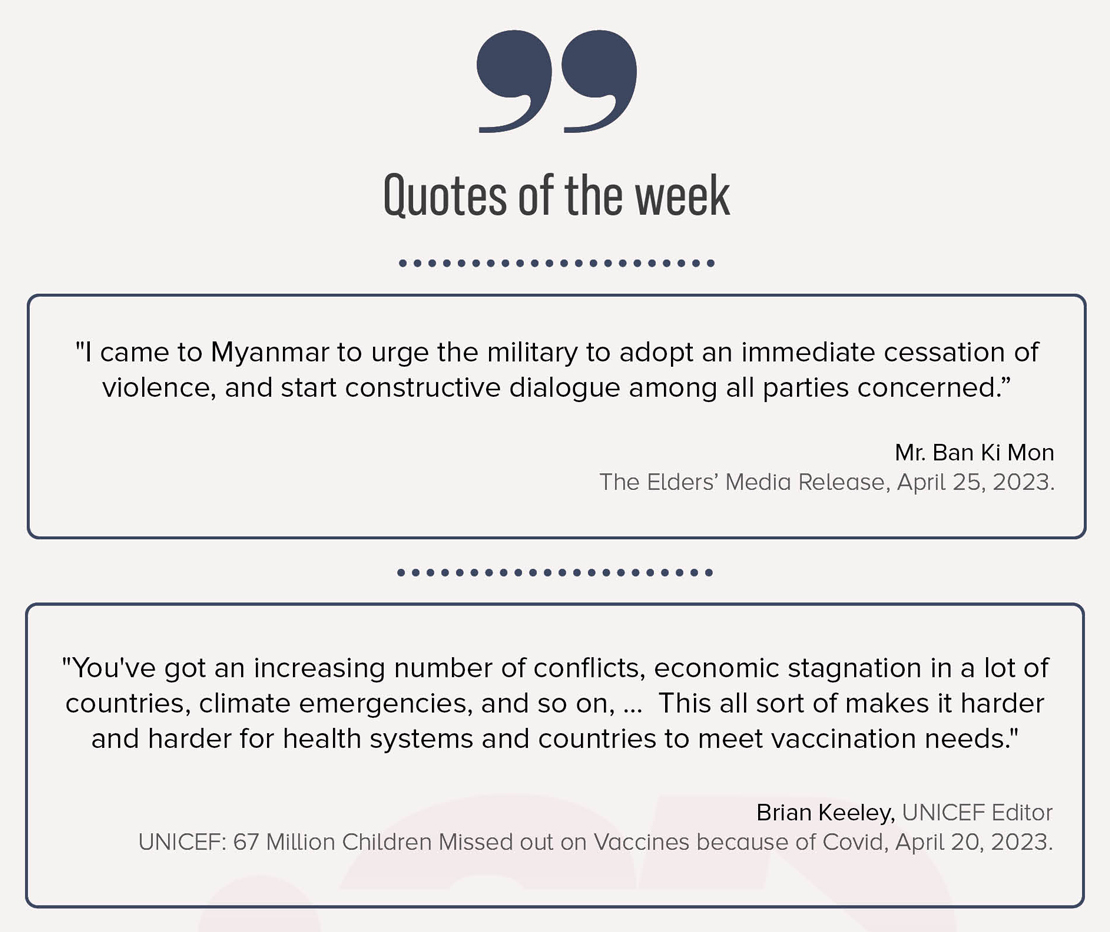
∎ Trends to be watched
Geneva Call’s Agreements with Myanmar EAOs and the Issue of Civilian Protection
The principle of ‘civilian protection’ is considered to be the most critical aspect in any conflict, as stipulated by various international humanitarian and human rights laws. Many parties conclude that the distinction between combatants and non-combatants, the proportionality of the use of force, issues of humanity, and the honor of human dignity are essential elements for waging a just war.
‘Civilian protection’ is also a major concern in the ongoing Myanmar conflict. Both the state party and the military, the Tatmadaw, have come under criticism for their actions. On October 25, 2022, the State Administration Council (SAC) carried out an air attack on a music concert in Ananpa village, Phar Kant Township, killing dozens of people. Then, on April 11, 2023, the SAC reportedly bombed a gathering of people at an opposition office-opening ceremony in Pazigyi village, Kant-Balu Township, resulting in the tragic loss of more than 160 lives.
Opposition forces should also be held accountable for their actions, including an attack on pilgrims at Kyaik-Hti Yo Pagoda, the shooting of a civil aviation plane at Loikaw, and recent bombings at Insein Prison and during the traditional ‘Thin-Gyan’ water festival at Loikaw, Than Phyu Zayat, Lashio, and Kywe-Pone village of Sagaing Township, and Ngwe-Twin village of Ayartaw Township. All of these incidents have caused significant loss of life and have raised concerns about civilian protection in the Myanmar conflict. The 2015 Nationwide Ceasefire Agreement (NCA), included clauses aimed at protecting civilians. Similarly Geneva-based non-governmental organization, Geneva Call has made several agreements with EAOs, the de facto regional authorities within Myanmar. These agreements have emphasized humanitarian norms and respect for basic rights. For many armed groups, whether signatory parties to the Geneva Call or not, it is important to observe the development of strict adherence to these agreements, as well as increasing awareness, education, promotion, and protection of civilian rights.
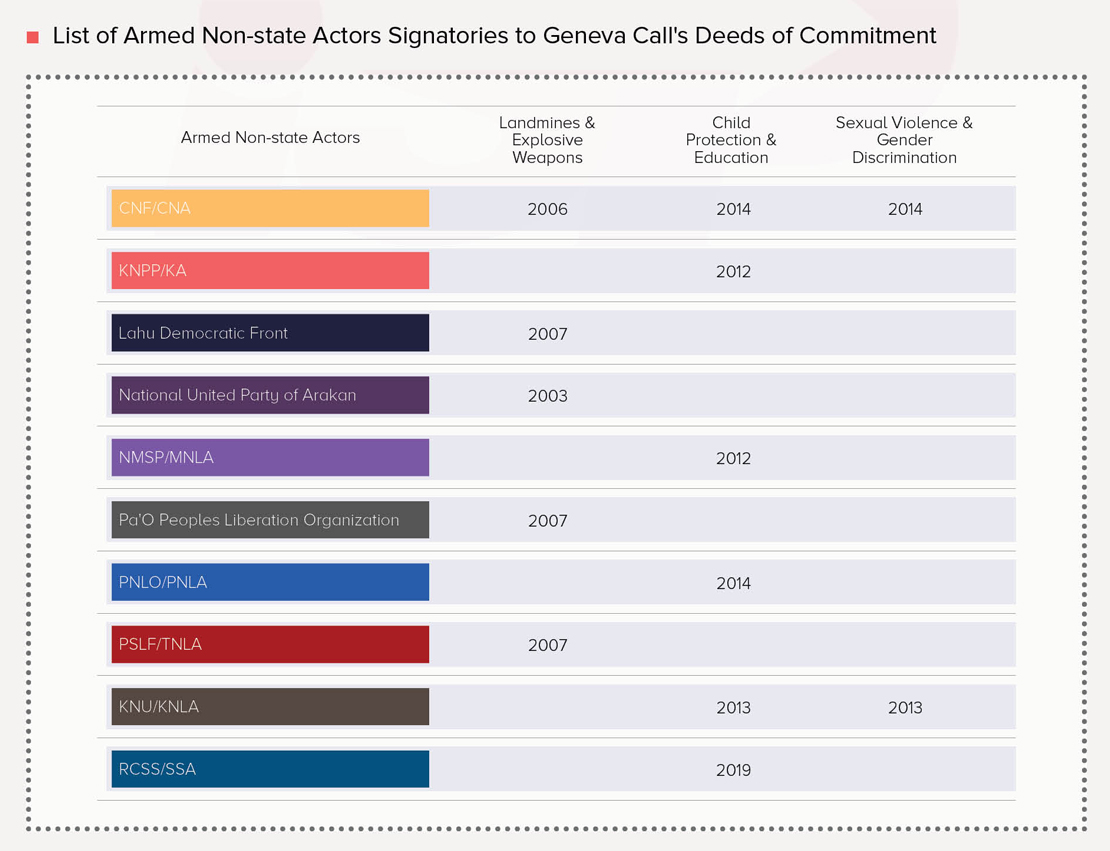
∎ What ISP is reading?
Thin-Gyan’s Thangyat
This week, instead of actually reading, we are rather listening to the traditional Thangyat during the Thin-Gyan water festival. Thangyat is quite a unique tradition in Myanmar and is inseparable from the Thin Gyan. Thangyat is a unique performance art that combines traditional folk verse chanting with rhythmic drumming and even rap-like lyrics, accompanied by dance and song routines. The performances are often humorous and satirical, providing a platform to express social and political grievances and public opinions. While the general public enjoys a good Thangyat, some authorities have little tolerance for it, leading to a divide in opinion on this traditional art form. Nonetheless, Thangyat continues to be an important part of Myanmar’s cultural heritage and a source of entertainment during the annual water festival.
Chanting within a Thangyat can be a form of freedom of expression practiced by people of the grassroots. This year, many Thangyats are mushrooming online on social media, and many troupes from warring areas and displaced communities have organized unusual Thangyats containing chants that reflect their current hardships and oppression under military rule. Some groups have used Thangyat as a mobilization tool for the resistance movement. Meanwhile, some young activists’ Thangyat groups have bluntly criticized the opposition National Unity Government (NUG) and National Unity Consultative Council (NUCC).
ISP-Myanmar has found scores of Thangyat troupes online, including “Bamboo Stick of Anyarthar” Thangyat group and “Shwe Nwe Thway” Thangyat group from Yin Mar Bin Township of Sagaing Region, “Tamar Moe” Thangyat group, a combined effort of twelve student unions, “Anyar Pit Taing Htaung Lay Myar” Thangyat group of Sagaing,“Daung toe Myo Sett” Thangyat group“Mawra Aung Than” Thangyat group of Wetlet Township Basic Education Students’ Union, “Htaung Yoe Nanyan Poke Hnoe Than” Thangyat group, and many more.
Some Thangyat groups are reflecting on the atrocities of war and how the villages are burnt:
“There are more than two years of coup, … what is the progress for the people,
Myanmar amid the ashes of ruins, … this is your doing culprit of violence.
Tears amid the burnt field … can it be thrown down like Thin-gyan water?
If you burn down the whole village, all the villagers will be revolutionaries.
Wait a moment, I have to say …
Please support our fellow neighbor villagers.
Taking care of ourselves as fellow citizens … let’s save ourselves from war.”
Youth from Myaung Township composed their Thangyat as:
“Burning at the time of Thin-Gyan, …can it be brought down by ThinGyan water.
The summer heat of Anyar in Thin-Gyan… can it be cooled down by Thin-Gyan water.
People hiding among the forest and mountains… so valuable for a drop of water…”
The “Tamar Moe” troupe formed from twelve student unions bluntly questions the opposition NUG in their chanting:
“Let’s celebrate revolutionary Thin-Gyan… let the people be united. Can the (student) union be broken by the power of arms?”
“The government could be simple from the start… can we say it is similar to the NUG?
Arms-broker MPs (members of parliament) … happy with business around Mae Sot … with car and with wife.
Our minister is so beautiful … so is with a perfect nose,
NUG for a transition … your positions will not be assumed as permanent, Work with exact (rules and regulations) … make a brave decision and don’t avoid your duty”.
“We will also go to the NUCC … Behave yourself, control, control. NUCC is said to be comprised of multiple organizations … but no EROs join it.
To hold a bi-annual conference … are you still falling asleep NUCC? Then the CDM policy comes out … it takes a year for four sentences. NUCC is leading the revolution, …many citizens aren’t aware of it”. If people are genuinely receptive to criticism, they should not take offense to words chanted in Thangyat during Thin-Gyan. Thin-Gyan celebrations would not be perfect without the essential Thangyat chanting, would you not agree?
